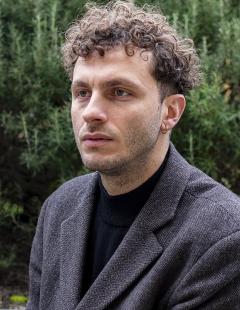Erick Moreno Superlano
Tell us about your background
I am from Venezuela. I lived in Argentina and Germany where I used creative writing as a means to reflect on my migration experience. Before coming to ODID, I studied Literature and Social Theory in Berlin. During my studies, I understood the complexities of my migration journey through an academic lens. Thanks to that, I discovered that I not only want to reflect on the geopolitics of human (im)mobility through creative writing but that I want to be a Migration Studies scholar.

“I was afraid that Oxford was a hyper-exclusive place where a Global South migrant like me was not going to fit in well. Fortunately, I was mistaken.”
“I was afraid that Oxford was a hyper-exclusive place where a Global South migrant like me was not going to fit in well. Fortunately, I was mistaken.”
What made you choose to study at ODID?
One day, talking to my undergraduate academic advisor about my future, I made a joke about applying to his alma mater, one of the world's top universities. I was confused that he didn't think I was joking. He told me it was a good idea. He said that with my grades, it was not crazy to apply to top universities for graduate school. For a Latin American immigrant, it was not obvious that this was an option. I would never have even considered it. This short conversation with my academic advisor had a massive impact on me. It changed the way I saw myself and, for the first time, I questioned the idea of top universities being only for the elite. Despite my doubts that it would work, I applied to ODID because it offered the best conditions for my academic success. It offered me the methodological foundation I needed for conducting research on the geopolitics of human (im)mobility and an unparalleled community of migration scholars. I will always be grateful to my undergrad academic advisor for encouraging me to apply to the best program. That was ODID's MSc in Migration Studies for me.
What do you particularly like about ODID?
There were two aspects of my ODID experience that I particularly enjoyed. On the one hand, I had the honour of studying alongside and learning from my cohort members. Everyone in the group was extremely intelligent and generous. On the other side, the supervision I received was crucial. My relationship with my supervisor was and continues to be fantastic. His insights into the subject of my master's dissertation were invaluable. This dissertation will serve as the foundation for my DPhil, on which I will continue to collaborate with my supervisor.
What do you particularly like about your course of study?
Aside from having the opportunity to learn migration theory from world-class experts in the subject, ODID's MSc in Migration Studies allowed me to transition to the DPhil in Migration Studies.
What did you research for your dissertation?
My dissertation is about governance mechanisms that generate immobility in the Global South through narratives that heroize sedentarism, moralize space, and stigmatize mobility.
What other activities have you been involved with at Oxford?
I was involved in various initiatives with the Refugee Study Centre (RSC), Mansfield and Somerville Colleges, to help the university in obtaining Sanctuary University status. My studies at ODID meant not just a personal intellectual achievement, but also an opportunity to promote positive change for migrants and refugees like myself outside of academia.
Is life at Oxford different from how you expected it to be?
I was afraid that Oxford was a hyper-exclusive place where a Global South migrant like me was not going to fit in well. Fortunately, I was mistaken. The vast majority of the people I met were relaxed and humble. I made good friends, including other people with similar life experiences to mine. ODID informed this impression of the university that I developed because the students and faculty members it attracts are engaged in topics concerning the Global South, social justice, and economic inequality. As a result, the department becomes a hub for critical thought on power and privilege where I felt comfortable.
What advice would you give to someone thinking of applying?
Although it is very rewarding, consider that it is a very demanding and difficult program. At least it was for me. If you like the theory on the (geo)politics of human mobility, and you like to work hard, this is an excellent program.
Photo credit: Ander McIntyre
